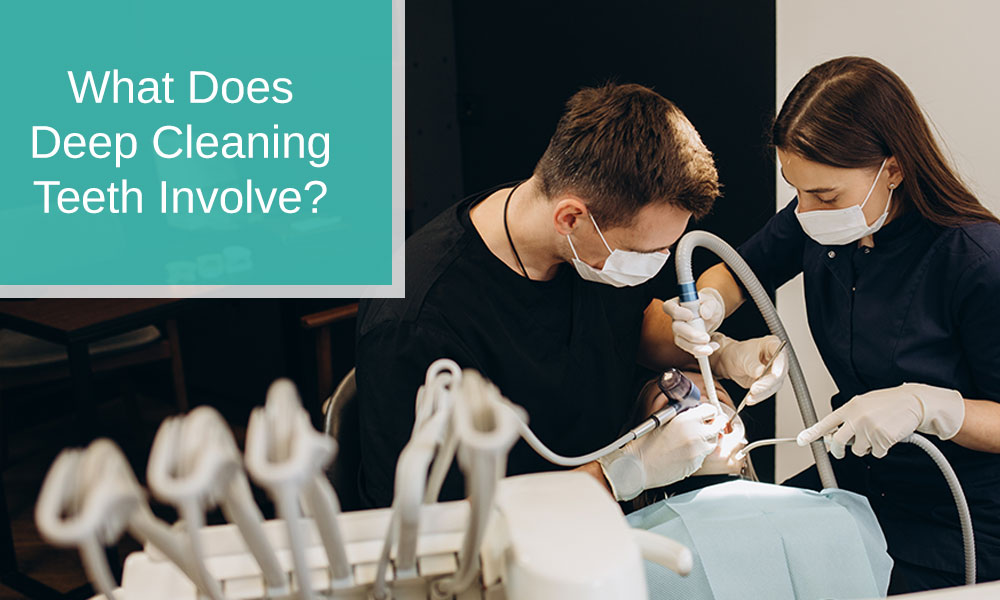Dental health is a cornerstone of overall well-being, and deep cleaning teeth plays a major role in maintaining a healthy and vibrant smile. We will delve into the intricacies of deep cleaning, its significance, and the processes involved. Understanding deep cleaning is essential for anyone looking to prioritize their oral hygiene and prevent serious dental issues.
What is Deep Cleaning?
Deep cleaning, also known as scaling and root planing, is a specialized dental procedure that goes beyond a regular cleaning. Unlike standard cleanings that focus on the surfaces of the teeth and gums, deep cleaning targets the removal of plaque and tartar that have accumulated below the gumline. It is important to regularly take hygienic practices on teeth.
Importance of Deep Cleaning vs. Regular Dental Cleanings
Regular dental cleanings are typically performed by dental hygienists and focus on the surfaces of the teeth. However, deep cleaning is necessary when there’s a buildup of tartar below the gumline, leading to more serious conditions like gum disease and periodontitis.
When and Why Deep Cleaning May Be Necessary
Deep cleaning becomes necessary when gum disease is detected, and pockets form between the teeth and gums. This procedure helps to eliminate bacteria and prevent further progression of the disease.
The Deep Cleaning Process
Deep cleaning involves two main components: scaling and root planing.
Scaling: Breaking down the basics
Scaling is the initial step in deep cleaning and involves the removal of plaque and tartar from the tooth surfaces, both above and below the gumline. Dental professionals use specialized tools, including ultrasonic scalers and hand scalers, to carefully remove these deposits.
Root Planning: Delving into the details
Root planing focuses on smoothing out the root surfaces of the teeth, making it more challenging for bacteria to adhere. This step promotes the healing of the gum tissue and reduces the depth of the pockets that form due to gum disease.
Common Deep Cleaning Techniques
- Ultrasonic Scaling: Utilizes high-frequency vibrations to break down and remove tartar.
- Hand Scaling: Involves the use of manual tools to scrape off deposits.
- Laser-assisted Scaling: Uses lasers to target and remove bacteria and tartar.
Deep cleaning techniques may vary based on the severity of the condition and the dentist’s preference.
Signs You Need Deep Cleaning
Recognizing the signs that you may need deep cleaning is critical for proactive dental care. If you experience any of the following symptoms, it’s advisable to consult with your dentist:
- Bleeding Gums: Especially during brushing or flossing.
- Persistent Bad Breath: A sign of bacterial buildup.
- Swollen or Red Gums: Indicative of inflammation.
- Receding Gums: Exposing more of the tooth’s surface.
Early intervention can prevent the progression of gum disease and the need for more invasive treatments.
Who Needs Deep Cleaning?
Deep cleaning is often recommended for individuals with specific risk factors that make them more susceptible to gum disease. These factors include:
- Poor Oral Hygiene: Inadequate brushing and flossing habits.
- Smoking and Tobacco Use: Increases the risk of gum disease.
- Genetics and Family History: Some people are genetically predisposed to gum issues.
Conditions like gingivitis and periodontitis may necessitate deep cleaning to address the underlying issues and prevent further damage.
Benefits of Deep Cleaning
The advantages of deep cleaning extend beyond the dental chair. Understanding these benefits underscores the importance of this procedure:
- Improving Gum Health: Reducing inflammation and promoting gum healing.
- Preventing Tooth Loss: Halting the progression of gum disease.
- Enhancing Overall Oral Hygiene: Eliminating harmful bacteria for better dental health.
- Potential Impact on Systemic Health: Some studies suggest a link between gum health and systemic conditions.
Maintaining optimal oral hygiene through deep cleaning contributes to your overall well-being.
What to Expect During and After Deep Cleaning
The Deep Cleaning Procedure Step-by-step
- Evaluation: Your dentist will assess the extent of gum disease and determine the areas that require attention.
- Anesthesia: Local anesthesia may be administered to ensure a comfortable experience during the procedure.
- Scaling: Plaque and tartar are meticulously removed using appropriate tools.
- Root Planing: Smoothing out the root surfaces to promote healing.
- Post-Procedure Care: Your dentist will provide instructions for at-home care to support recovery.
Discomfort and Pain Management
While deep cleaning may cause some discomfort, local anesthesia is commonly used to minimize pain. Over-the-counter pain relievers and anti-inflammatory medications can be helpful post-procedure.
Post-Treatment Care and Maintenance
Following deep cleaning, maintaining good oral hygiene practices is important. This includes regular brushing, flossing, and using an antiseptic mouthwash as recommended by your dentist.
FAQs About Deep Cleaning Teeth
How long does a deep cleaning session take?
The duration of a deep cleaning session depends on the severity of the condition. On average, it may take anywhere from one to two hours.
Does deep cleaning hurt?
Local anesthesia is typically administered, minimizing pain during the procedure. Some discomfort may be experienced afterward, but it is manageable with over-the-counter pain relievers.
Are there any risks associated with deep cleaning?
While deep cleaning is generally safe, some individuals may experience temporary sensitivity or discomfort. Serious complications are rare, and your dentist will discuss potential risks before the procedure.
How often should one undergo deep cleaning?
The frequency of deep cleaning depends on individual dental health. Your dentist will recommend a schedule based on your specific needs, which may range from every three months to once a year.
How Much is Teeth Cleaning Cost Without Insurance?
The average cost of teeth cleaning without insurance is an estimated $130 each time you visit the dentist.

